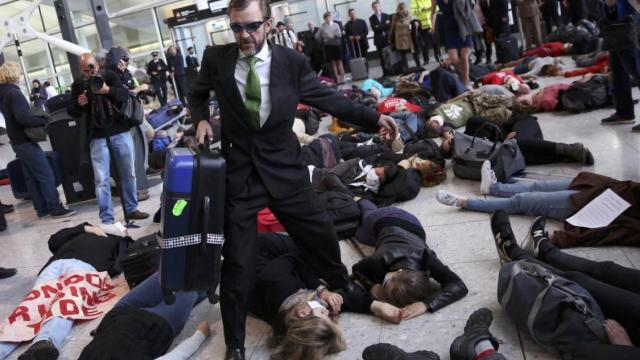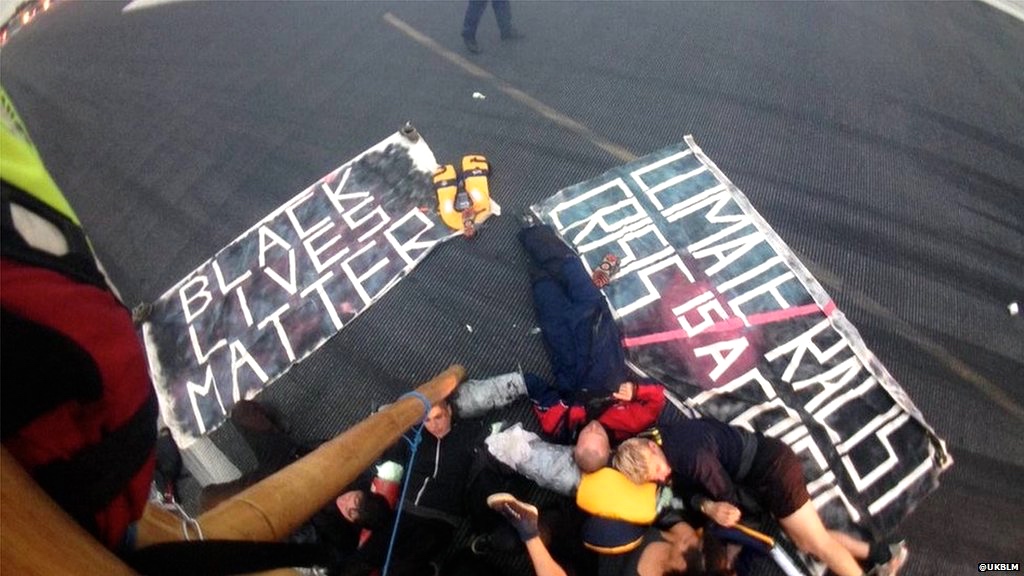
A frequent flyer busy on her cellphone steps over and ignores the bodies on the floor as she checks in for a Saturday flight at Heathrow Airport.
This was part of a “die in” at the London airport, the busiest in Europe. The flash mob, coordinated on October 1 by the group Reclaim the Power, also staged a frequent flyer check-in for the 1%. It made the point that the planned expansion of one of London’s airports — the decision whether it will be Heathrow or Gatwick is expected later this month – is being driven by a cabal of mostly wealthy passengers.
In the U.K., 70 percent of flights are taken by 15 percent of the population, a demographic that often has second homes or salaries above £115,000. In other words, they represent the 1%.
Across the globe, only 5 percent of the population has ever flown. Aviation is also the fastest growing sector of carbon emissions worldwide. These emissions are even more dangerous as a large proportion are emitted at altitude, which magnifies their impact.
Simultaneous to the die-in, a critical mass cycle ride occupied the roads around Heathrow on Saturday, with protesters dressed in red. The cyclists made the point that airport expansion was another "red line" we cannot go beyond to tackle climate change.
The hundreds on bikes also visited Harmondsworth Immigration Removal Centre to protest the U.K. government’s asylum policies. The protest highlighted how many people in immigration detention have fled their homes as a result of climate change – whether driven by oil-caused wars, famines, droughts or other knock-on effects. During the die-in inside the airport, protesters spoke on behalf of those people worst hit by climate change in the Global South.
Airport Protests in a Global Context
The #Staygrounded action at Heathrow formed part of a global day of action, connected to the Zone to Defend (ZAD) in France fighting to retain an ancient forest, and a Mexican protest against an airport that caused the massacre of local farmers. There were further actions in Turkey and Austria, all timed to coincide with the UN International Civil Aviation Organization meeting in Montreal. As yet, aviation emissions are not included within carbon targets.
The actions follow a groundswell of demonstrations focusing on air travel in Britain and beyond. The plan to expand Heathrow has faced broad and sustained opposition from local campaigns working alongside environmental ones. Last year, climate activists closed a runway with a tripod and lock-on. These 13 campaigners were threatened with prison sentences, which were only avoided due to a massive public backlash.
In September, Black Lives Matter U.K. shut down the City of London Airport runway to make the point that climate change disproportionally hits black communities, both on a local and global level.
Climate crisis is a racist crisis. Cut emissions. Open borders. #Shutdown. pic.twitter.com/IUOaeaTrmw
— #BlackLivesMatterUK (@ukblm) September 6, 2016
The London borough of Newham, which surrounds City Airport, is largely composed of black communities who suffer life-threateningly low air quality from the planes. The pattern of heavy pollution nearest communities of color is repeated worldwide. Oil and other carbon intensive industries often contradict the principle that Black Lives Matter. Clear examples include the many global regions devastated by oil extraction, where land has been stolen from communities of color, and destroyed; wars predominantly caused by oil imperialism; and the climate pollution that worst impacts the Global South.
Black Lives Matter UK highlights that seven out of 10 countries worst impacted by climate change are in sub-Saharan Africa, and by 2050 there will be 200 million climate refugees globally.
Last weekend's City Airport action was Black Lives Matter UK’s second airport demonstration. On Aug. 5, the group blocked key roads leading to Heathrow and Birmingham airports, as well as major transport connections across the country, demanding Britain stop the racist deaths in police custody and the racist policing of borders.
A striking feature about the Black Lives Matter action, and the latest one at Heathrow, is how environmental issues are being connected with racism and inequality.
“I feel like it is long overdue. A growing part of the climate movement has been talking and thinking about climate justice,” protester Sheila Menon tells Occupy.com. Menon is one of the Heathrow 13, and is a second generation British Asian engaged with Reclaim the Power. The concept of climate justice, she says, asserts that those who profited from climate change – the richest nations and individuals – should be held responsible for its devastating consequences.
As Black Lives Matter UK explains: “Black people are the first to die, not the first to fly, in this racist climate crisis.”
Even though the climate movement is slowly changing and becoming more intersectional, Menon tells me it is still predominantly white. “When I go to a climate camp, I can count the number of black people on one hand,” she says. For her, the climate movement needs to connect even further with other social justice causes and listen to find out what other people’s issue are.
“Climate is interrelated to every issue, whether it is food sovereignty, land rights, fuel prices, wealth distribution, resources, wars, migration. It affects everything. Climate change will be the biggest cause of all social unrest we are watching unfold before our eyes," she adds. "It is not solely about floods or weather patterns. It is about people being uprooted because the land is unlivable, or the crops are failing.”
Widening the climate movement to include a range of other issues often faces resistance from protesters, but she asserts this shouldn't be the case. “People think it will dilute the movement’s energy and resources. But it is essential to understand others issues and create real solidarity. The climate movement needs to branch out, as climate change is too abstract. Nobody can get their head around it. Even I cannot get my head around what a 2 degree rise in global temperatures means, until I see a scientific model.”
For Menon, the climate movement instead needs to broaden itself in the way that economic inequality has become a core part of every social justice campaign. She points out that today it is widely understood that policies favoring the 1% are a root cause of the world’s systemic problems. The weekend actions in London, she says, showed that movements can garner from a deeper intersectional understanding – because there is no environmental justice without social justice, and vice versa.
3 WAYS TO SHOW YOUR SUPPORT
- Log in to post comments













